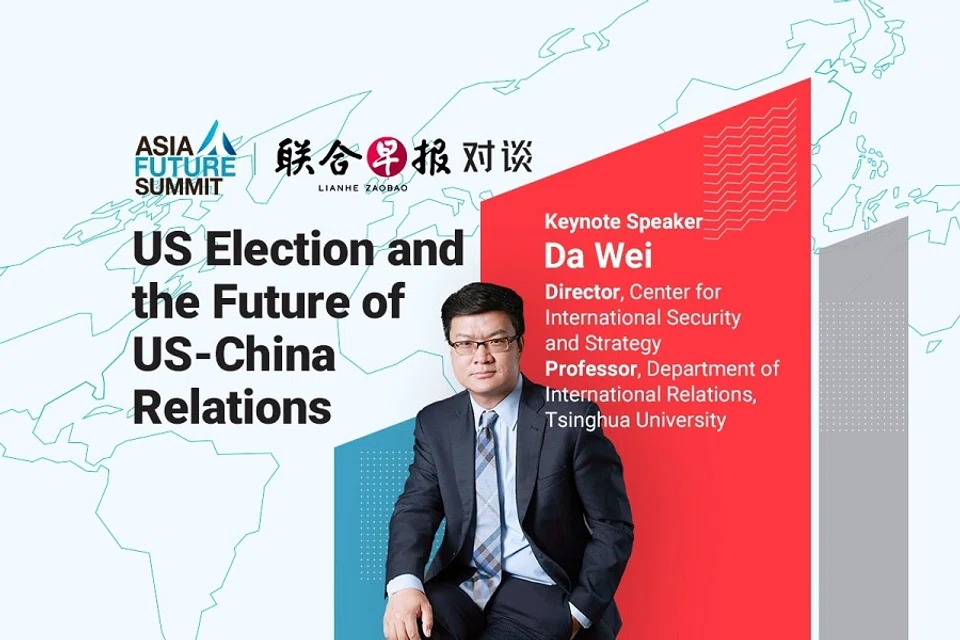Lianhe Zaobao Conversations to explore US elections and the future of China-US relations
Lianhe Zaobao journalist Liu Sha tells us more about Lianhe Zaobao Conversations to be held on 3 September as part of the Asia Future Summit series. Keynote speaker Da Wei of Tsinghua University will be sharing his insights on the US elections and the possible impact on China-US relations.

China-US relations are ever-changing, and the forthcoming US presidential election in November adds further uncertainty to this dynamic. How do the two US presidential candidates differ or align in their China policies? What might be the trajectory of China-US relations post-election, and what implications could this have for Southeast Asia and Singapore?
The Lianhe Zaobao Conversations, set to be held on 3 September as part of the Asia Future Summit (AFS) Series, shall explore the above questions.
Da Wei, director of the Center for International Security and Strategy and professor at the Department of International Relations at Tsinghua University, will speak on “US Elections and the Future of US-China Relations”, leveraging both his deep understanding of China and on-the-ground observations of the US, to explore the impact of the US presidential elections on the geopolitical situation, as well as looking ahead at the future trends of China-US relations.
Da said when interviewed that he would give a detailed analysis in his speech of the strategic aims and diplomatic strategies of the two US presidential candidates, as well as the corresponding impacts on China-US relations and Southeast Asian geopolitics.

He stated that this US presidential election is of critical significance and will have a direct impact on China-US relations and various regions globally, especially Southeast Asia.
Two distinct candidates, two different outcomes for China
He felt that in the past few decades, China, US and other Asia Pacific countries have progressed under globalisation and the prioritisation of economic benefits, with both China and the US benefiting from the situation, and maintaining a relatively stable relationship. However, this phase has passed, and the US is still figuring out its direction for the next stage.
... the policy directions of the two candidates are fundamentally different. Thus, the challenges each would pose to China after the election, as well as the potential opportunities for China, will vary significantly.

Da said: “This election will allow us to witness the emergence and competition of different solutions, as well as how the US, as a major country, might evolve in the current global upheaval, including its approach to shaping international diplomatic policies.”
Some argue that US policies toward China will remain tough regardless of the presidential outcome. However, Da opined that the policy directions of the two candidates are fundamentally different. Thus, the challenges each would pose to China after the election, as well as the potential opportunities for China, will vary significantly.
Last year, the three flagship news titles under SPH Media — Lianhe Zaobao, Straits Times and the Business Times — jointly organised the Asia Future Summit for the first time. This year, under the banner of AFS, each of the three newspapers will host its own discussions.
The guest of honour for the Lianhe Zaobao dialogue is Singapore’s Deputy Prime Minister Heng Swee Keat. Tan Teck Long, head of Global Wholesale Banking at OCBC, will also participate in the dialogue to share his views on the impact of the US elections on the world economy. The moderator for the dialogue is Lianhe Zaobao’s associate editor Han Yong Hong.
The Lianhe Zaobao Conversations as part of the AFS Series is proudly presented by OCBC and OCBC premier banking, with ThinkChina — an English-language e-magazine powered by Lianhe Zaobao — as supporting media. The dialogue will be attended by around 200 guests, and a complete video recording of the dialogue will be uploaded online for viewing after the event.
This article was first published in Lianhe Zaobao as “亚洲前瞻峰会之《联合早报》对谈9月3日举行 探讨美国选举与中美关系的未来”.



![[Photos] Fact versus fiction: The portrayal of WWII anti-Japanese martyrs in Taiwan](https://cassette.sphdigital.com.sg/image/thinkchina/3494f8bd481870f7c65b881fd21a3fd733f573f23232376e39c532a2c7593cbc)

